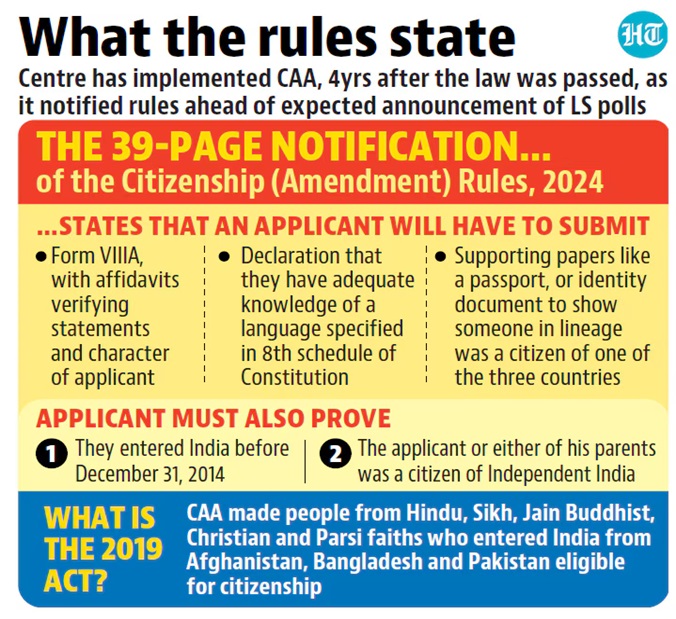PERVERSE INTENT: ON THE CITIZENSHIP (AMENDMENT) ACT
Relevance: GS 2 – Government policies and interventions for development in various sectors and issues arising out of their design and implementation.
Why in the News?
- The Citizenship Amendment Act (CAA), 2019 rules have been recently notified by the Indian Government.
- The application process for citizenship under CAA is governed by Section 6B of the Citizenship Act, 1955.
- Delay in Notification
- The rules of the CAA were notified by the Ministry of Home Affairs over four years since the Act was passed in Parliament, leading to questions about the timing and intent behind its implementation.
About CAA Eligibility Criteria:
- Country of Origin: Applicants must prove they are religious minorities from Pakistan, Bangladesh, or Afghanistan.
- Religion: Eligibility is based on belonging to specific religious communities, namely Hindus, Sikhs, Buddhists, Jains, Parsis, and Christians.
- Date of Entry: Applicants need to provide the date of their entry into India.
- Language Requirement: Knowledge of an Indian language is required to qualify for Indian citizenship.
Application Submission Process
- Electronic Submission: Applicants must submit their applications electronically to the Empowered Committee through the District Level Committee designated by the Central Government.
- Acknowledgment: An acknowledgment in Form IX is electronically generated upon submission of the application.
- Document Verification: The District Level Committee, led by a Designated Officer, verifies the documents submitted with the application.
- Oath of Allegiance: The Designated Officer administers the oath of allegiance, as specified in the Second Schedule to the Citizenship Act, 1955, to the applicant.
- The signed oath and confirmation of document verification are forwarded electronically to the Empowered Committee.
- Refusal Consideration: The committee has the authority to reject the application if the applicant fails to appear in person despite reasonable opportunities.
- Renunciation Declaration: Each application includes a declaration by the applicant renouncing their current citizenship, irrevocably and without future claim.
Narrow Definition of Persecution
- The CAA restricts the definition of persecution to “religious persecution” only, thereby excluding other potential grounds for persecution.
- It does not consider forms of persecution such as linguistic discrimination, as seen in the cases of Sri Lanka and erstwhile East Pakistan, from which Bangladesh originated.
Exclusion of Certain Groups
- The Act excludes Muslims, atheists, agnostics, and other religious groups from its purview, suggesting a biased and discriminatory approach.
- The Rohingya Muslims from Myanmar have faced severe discrimination, with thousands killed, over a million rendered stateless, and many fleeing to countries like India due to genocidal policies.
- The CAA does not address their plight.
Arbitrariness in Selecting Countries
- The CAA offers citizenship to migrants from an arbitrary selection of neighboring nations, specifically Pakistan, Bangladesh, and Afghanistan, furthering the perception of arbitrariness.
- Persecution and discrimination are not limited to these countries;
- For instance, even in Muslim-majority countries like Pakistan, minority Islamic sects such as the Ahmadiyyas have faced oppression and persecution.
Contradiction with Constitutional Ethos
- The CAA, by its very intent, contradicts the ethos of the Indian Constitution, which upholds equality, non-discrimination, and
- The Act’s focus solely on religious persecution is seen as a narrow and short-sighted understanding of the reasons for providing asylum and citizenship.
Petitioners’ Argument in Supreme Court
- The petitioners argue that the rules of the Citizenship Amendment Act (CAA) do not require foreign applicants to effectively renounce citizenship of their native countries.
- This omission allows for the possibility of dual citizenship, which is considered violative of the Citizenship Act.
Violation of International Refugee Conventions
- India is not a party to the 1951 UN Convention Relating to the Status of Refugees and the 1967 Protocol Relating to the Status of Refugees.
- These international conventions require signatories to provide refugee status to individuals facing various forms of persecution, not limited to religious persecution.
- Signatories are obligated to apply these provisions “without discrimination as to race, religion, or country of origin.”
- The CAA’s selective and discriminatory nature would be in violation of these international conventions if India were a signatory.
Call for Unconstitutionality and Revocation
- The petitioners urge the Supreme Court to declare the CAA unconstitutional due to its arbitrary and selective norms for providing citizenship to migrants.
- The implementation of the CAA should be revoked to uphold the principles of equality, non-discrimination, and secularism enshrined in the Indian Constitution.
Alternative Sources:
https://universalinstitutions.com/caa-turns-bengal-voters-focus-from-sandeshkhali/
Mains question
Discuss the criticisms and legal challenges against the Citizenship Amendment Act (CAA), focusing on its exclusionary nature and potential violation of international refugee conventions. (250 words)




